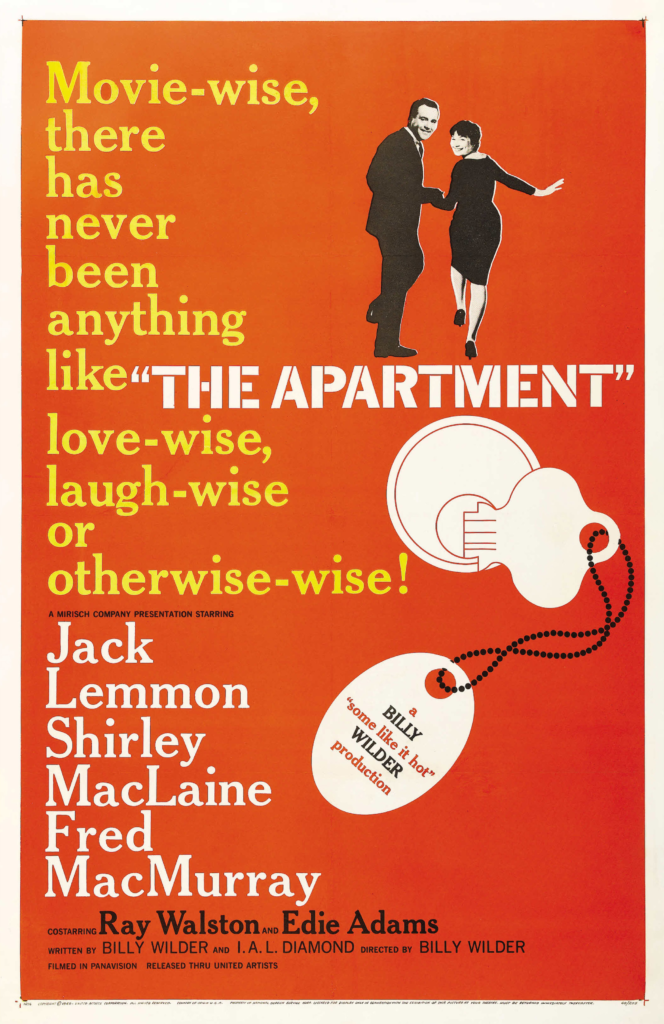The Apartment Christian Review

You know, there’s something timeless about The Apartment that makes it stick. It’s one of those films that lingers, not just because of the smart dialogue or the way Jack Lemmon plays the everyman like no one else can, but because of what it makes you think about. This isn’t your typical Hollywood feel-good movie. No, it’s more complex, full of moral gray areas and flawed characters. The kind of film that asks you to think twice, or maybe three times, about the cost of your choices.
And it’s funny—kind of. But also kind of sad. And in that tension, where you can’t quite tell whether to laugh or to wince, lies the beauty of Billy Wilder’s 1960 masterpiece.
The Corporate Grind: What’s Your Soul Worth?
Right from the start, you’re thrust into this gigantic, cold, dehumanizing office space. Rows and rows of identical desks, each one occupied by some faceless worker bee in a suit. They all look the same, they all seem to do the same thing, and they all answer to the same bosses who sit comfortably behind closed doors. The office is massive, almost absurdly so, but that’s the point: people get lost in there. It’s a visual reminder that when you’re part of this corporate machine, you don’t really matter as a person—just as a piece of the puzzle. Efficiency is the name of the game, not humanity.
This is where C.C. Baxter (Lemmon) comes in. He’s trying to claw his way up the corporate ladder, and to do it, he’s made a deal with the devil, so to speak. He lends out his apartment to his bosses so they can carry on their adulterous affairs. It’s gross, yeah, but it’s also so very human. Baxter’s lonely, ambitious, and willing to compromise his morals for a chance at success. Sound familiar? It’s a story as old as time, though maybe a bit more polished here. Wilder’s biting satire on corporate culture could easily be written today. You’ve got Baxter, a guy who’s basically selling out his integrity for a promotion, set against a backdrop of capitalism where people are treated like tools. We all know someone like that, or we’ve been someone like that.
And that’s what makes Baxter’s character so real. He’s not some saintly hero fighting for justice; he’s just a guy trying to get ahead, who eventually realizes that selling your soul isn’t worth the price. From a Christian point of view, there’s a clear lesson here: you can’t serve two masters (Matthew 6:24). You can’t live a life of compromise and still expect to keep your integrity intact. Sooner or later, something’s gotta give.
Romance, Brokenness, and Redemption
Then there’s Shirley MacLaine as Fran Kubelik, the elevator girl who’s caught up in a toxic relationship with one of Baxter’s bosses, Sheldrake. Fran is captivating, not just because of MacLaine’s performance, but because she’s such a layered character. She’s vibrant and charming on the outside, but underneath, she’s broken. She knows Sheldrake is bad for her, but she’s stuck in that all-too-familiar cycle of hoping that things will change, that maybe he’ll leave his wife for her. It’s heartbreaking because, deep down, Fran knows better.
This is where the Christian worldview comes in again. Fran’s story is one of a woman who’s searching for love and meaning in all the wrong places. Her affair with Sheldrake is just another example of humanity’s tendency to look for fulfillment in fleeting, empty things. It’s a reminder that we often settle for far less than what we deserve, and that true worth doesn’t come from a man’s affection or a job title, but from knowing who you are in Christ.
But it’s not all doom and gloom. There’s a redemptive arc here, too. Baxter, in his awkward, bumbling way, genuinely cares for Fran. He sees her pain, and by the end of the film, he’s willing to give up his dreams of corporate success to help her see her own worth. He chooses integrity over ambition, love over self-interest. It’s a powerful moment of transformation, where both Baxter and Fran break free from the destructive patterns they’ve been trapped in.
And sure, it’s not your typical Christian redemption story where everything ties up neatly with a bow, but the essence is there: repentance, self-sacrifice, and the hope for a better tomorrow.
A World of Moral Ambiguity
One of the things that sets The Apartment apart from other films of its time—or even films today—is how comfortable it is living in the gray areas. Most of the characters aren’t good or bad; they’re somewhere in between. Baxter starts off as a pushover who lets his apartment be used for adulterous affairs. Fran, for all her charm, is willing to be the “other woman” for a man who clearly doesn’t value her. And Sheldrake, though mostly detestable, is more pathetic than purely evil.
Wilder doesn’t give us clear heroes and villains. Instead, we get real people, full of contradictions and failings. That might make some Christian viewers uncomfortable, and for good reason. There’s a part of us that craves stories with moral clarity, where the lines between right and wrong are drawn in bold strokes. But life isn’t always like that, and neither is this movie.
There’s a lesson in the messiness, though. The Bible doesn’t shy away from the fact that people are flawed and complex. David, one of Israel’s greatest kings, was also an adulterer and a murderer. Peter, the rock of the church, denied Jesus three times. The point is, even in our brokenness, there’s hope for redemption, and The Apartment echoes that reality. It’s about finding your way back to the right path after you’ve gone astray, about choosing to do the right thing when it’s hardest.
Is It for Everyone?
Let’s be real: The Apartment isn’t going to appeal to everyone, especially if you’re looking for a movie with clear moral answers or a squeaky-clean narrative. There’s infidelity, moral compromise, and plenty of cynicism about the way the world works. And if you’re hoping for a laugh-out-loud comedy, well, this isn’t that, either. It’s funny, sure, but in a bittersweet way that leaves you feeling more thoughtful than joyful.
For Christians, this film requires a discerning eye. It’s not a morality play with clear-cut heroes and villains, and it doesn’t wrap everything up in a nice, neat resolution. But if you’re willing to engage with it on its own terms, there’s plenty to reflect on: the dangers of compromise, the value of integrity, the search for love and meaning in a world that often seems to cheapen both.
Final Thoughts
So, how do you rate something like The Apartment? On one hand, it’s a brilliant film—sharp, funny, emotionally resonant. On the other, it deals with some pretty heavy, morally ambiguous themes that can be hard to navigate.
But maybe that’s the point. Life’s complicated, and sometimes the most powerful stories are the ones that make us uncomfortable, that make us think and wrestle with where we stand.
As a Christian, I’d give it a solid 7 out of 10. It’s not perfect, and it’s not always easy to watch, but it’s real. And sometimes, that’s enough.




